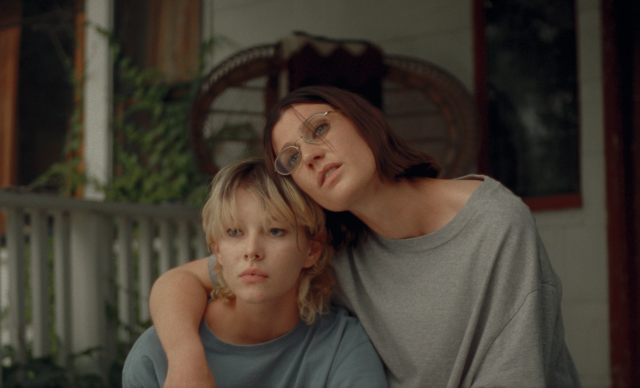Writer and director Sophie Jarvis helms a beguiling debut feature.

Until Branches Bend is a restrained, largely internalized drama that unfolds in Montague, a town lying in a verdant region of British Columbia. This place and its people are inextricably linked to the local peach crop, a lifeblood to the town. The community toils away with a sense of wariness, as an infection of the invasive burrow-moth several years earlier nearly resulted in the collapse of their ecosystem and economy.
Robin (Grace Glowicki) works as a grader at the local processing plant. During one shift, she finds a peach with signs of a worm hole. Breaking it open, she finds a beetle within, and immediately brings it to her boss, Dennis (Lochlyn Munro). Dennis dismisses it: The harvesting and processing will continue. But the discovery nags at Robin’s conscience, who continues to investigate in the face of pushback from her community, outright denial by her employers, and possible forced closure of the plant.
Further clouding Robin’s thoughts is the discovery that she is 10 weeks pregnant, the result of a short-lived affair with her married boss. Robin must try to do the right thing in the face of small-town politics and prejudice, a capitalist pushback against her, and a looming ecological disaster.

Until Branches Bend is expansive in its exploration of themes such as societal pressure, community conflicts, environmental concerns, conservative principles, and corporate interests. But these are peripheral to the focus on Robin’s plight. Obvious parallels come between her two plotlines, each encircling life and its potential impact growing just beneath the surface. The emotional conflict of dealing with her pregnancy might be what drives some of the more obsessive qualities of Robin’s investigation, as she looks to make a difference in a situation that feels more under her control than that of the peaches. The film is a pretty damning commentary on reproductive choice in Canada, illustrated by the time and distance Robin is forced to endure for abortion access, as well as the state-mandated diatribe on the potentially harmful effects of having an abortion.
Immersion in Robin’s headspace through Glowicki’s performance, pensive scenes, dynamic cuts, and emotive framing all tilt the drama into a psychological thriller. Cinematography by Jeremy Cox gives the film an rustic, lived-in quality. Shot in 16mm, the grain-infused edge is well leveraged into crafting a frontier feeling, fueling Robin’s isolation and hinting at the threat just on the horizon. Kieran Jarvis’s score veers from effective to intrusive, with an an overly liberal use of flutes piercing through the crafted tone. Other missteps are largely limited to the suspension of belief required to accept the isolation of Robin as the only one clued into the emerging infestation in the town, as well as a thin sketching of some of the antagonistic characters.
Glowicki’s performance is quietly compelling, portraying a timid, idealistic woman who seems set on clinging to hope in the face of rejection, castigation, misrepresentation, and outright gaslighting. Alexandra Roberts plays her younger sister Laney as a wonderful counterpoint, a rebellious soul more concerned with escaping the town than preserving it. The pair endure a coming-of-age experience that strengthens their bonds of sisterhood and forms a strong emotional core for the entire story.
Until Branches Bend is a beguiling debut feature from writer/director Sophie Jarvis, one with a distinct aesthetic and scope, deftly centered around the psyche of one woman who has the past, present, and future swirling around her mind.



